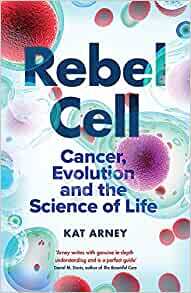
Rebel Cell: Cancer, Evolution and the Science of Life
by Kay Arney
Genres: Non-fiction, SciencePages: 390
Rating:

Synopsis:Cancer has always been with us. It killed our hominid ancestors, the mammals they evolved from and the dinosaurs that trampled the ground before that. Tumours grow in pets, livestock and wild animals. Even tiny jelly-like Hydra, creatures that are little more than a tube full of water, can get cancer.
Paradoxically, many of us think of cancer as a contemporary killer, a disease of our own making caused by our modern lifestyles. But that's not true. Although it might be rare in many species, cancer is the enemy lurking within almost every living creature. Why? Because cancer is a bug in the system of life. We get cancer because we can't not get it. Cancer starts when cells revolt, throwing off their molecular shackles, and growing and dividing out of control in a shambolic mockery of normal life. This is why we can't avoid cancer: because the very genes that drive it are essential for life itself.
The revolution has raged, on and off, for millions of years. But it was only in the twentieth century that doctors and scientists made any significant progress in understanding and treating cancer, and it's only in the past few decades that we've finally begun to kick the mob's malignant arse. Now the game is changing. Scientists have infiltrated cancer's cellular rebellion and are finally learning its secrets. Geneticist and science writer Kat Arney takes the reader back to the dawn of life on planet earth right up to the present day to get to the heart of what cancer really is and how by better understanding it we might one day overcome it.
Cancer is a fascinating topic, but always a bit scary for me too: it’s a fine balance. Kat Arney’s Rebel Cell walks that line pretty well: she delves into a lot of very fascinating aspects of cancer, with one particular focus that I very much appreciated. Namely, that cancer is basically a microcosm of evolution, in a very similar way to microbes: with a short generation time, it can quickly respond to selective pressures and find ways around treatments.
That’s the terrifying part: it may be that some of our cancer treatments are barking way up the wrong tree, creating resistant cancers that have no known treatment. Arney also criticises the trend of super-individualised cancer treatment plans via genetic testing, pointing to the heterogeneity of cells in a cancer. Cancer isn’t any one thing, it’s a population of rapidly expanding cells which have lost a lot of the brakes that stop them mutating further and developing harmful quirks.
It’s not all gloom, because she does also note a few different options that might be worthwhile: treating cancer as a chronic disease and managing it carefully, allowing it to grow and shrink over time, without expecting to eradicate it — or using cocktails of drugs to hit multiple targets at once, or varying treatments when progress slows to try a new target.
There’s also some really fascinating stuff about contagious cancers (more common than you’d think), what looks quite like sexual reproduction between cancer cells, etc. It’s not a super quick read, but I was riveted.
Rating: 4/5
